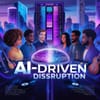Artificial intelligence is no longer a side‑tool for musicians; it now powers the entire value chain. Algorithms scout talent by sifting through TikTok trends and playlist spikes, while AI‑driven studios can write, arrange, mix and master a track in minutes. This speed flips the old “slow‑expensive‑human‑made” model on its head, exposing inefficiencies that once relied on human gatekeepers to process data and move content .
The shift is structural, not just creative. Smart contracts and automated royalty splits track ownership in real time, and AI agents handle marketing campaigns, email blasts and even pitch decks in a brand’s voice. By automating metadata tagging, genre classification and content ID, the technology removes the need for manual intermediaries, letting artists own their masters, data and fan relationships directly .
This new infrastructure reshapes power dynamics. Major labels and tech giants race to build “AI song engines” that control the pipelines for discovery and monetisation, while independent ecosystems—like Sauce Economy, Audius and Nina Protocol—offer creators a private, creator‑first stack. Owning the data and automation stack becomes the modern definition of a label, turning the industry from scarcity‑based to an infinite, data‑driven marketplace .
The debate continues: some see AI as a threat to originality and jobs, fearing a flood of algorithm‑generated noise that drowns human artistry. Others view it as a catalyst for hybrid creativity, where artists leverage AI to spark ideas, overcome writer’s block and reach audiences faster. The future likely rests on a balance—using AI to amplify human vision while safeguarding authorship and ethical use .


